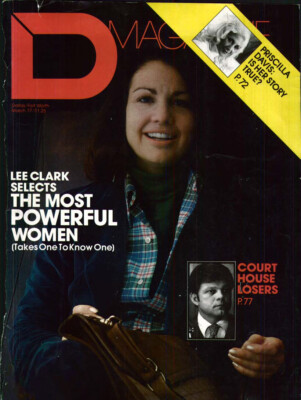Recently Texas Attorney General John Hill needed to track down all the information he could find that had appeared in 1973 pertaining to the late Howard Hughes. His staff contacted the Dallas Public Library. By using a remarkable computer information service now provided by the library, business librarian Bob Luberda was able to come up in less than ten minutes with everything written about Howard Hughes in 1973. Using more conventional methods, the search might have taken several hours.
The computer Luberda used is a terminal of the New York Times Information Bank, an information search service containing more than 1.1 million items with more being added daily. General information from more than 75 sources is continually being condensed into abstract form and indexed into the computer. Sources include primarily the New York Times and the Wall Street Journal as well as the Los Angeles Times, the Chicago Tribune, Houston Chronicle, Time, Newsweek, Atlantic, Harper’s, the Manchester Guardian, and the Latin American Economic Review. “It’s really wide-ranging although it goes more in the line of business information,” Luberda says.
The information bank, the only one of its kind in North Texas, can answer any kind of current events question that has appeared in the New York Times source list since 1969. “During the political campaign you could have found out the position of Carter and Ford on various issues,” Luberda points out. “You might want to know the effect of oil price rises on the American economy or the European economy or the location, with maps, of all oil leases in the Caribbean.
“We probably average between 10 and 15 searches a month,” Luberda says. “Advertising agencies use it for in formation on products, research stu dents use it. The Texas State Library is trying to get legislators to use it.” Lu berda himself recently requested infor mation on what scientists are saying about a possible new Ice Age.
The service, which costs the library about $20,000 a year, is available te anyone who wants to pay the $2 per minute fee. The average length of a search is between five and ten minutes. “It saves a lot of time,” Luberda points out. “If you spend 15 minutes and find 30 articles, then you’ve probably saved at least two hours that it would normally take just to find the articles.”
When a person has a request, Luberda discusses it with him to narrow the search as specifically as possible, then he makes a telephone connection to hook the computer into the New York offices. Next he enters a general category. The computer then offers more specific categories until it finds the exact information required. In its answer, the computer gives the date and source of the article, the number of articles available on the subject, the type of article it is (analysis, interpretive, editorial) and whether or not there are accompanying illustrations. It also provides article abstracts and print-outs at no extra charge.
Related Articles

News
Methodist Charlton Names New CEO and Steward Offloads Five More Hospitals for $1.1 Billion
Plus Texas Health Mansfield's new president and CEO, TimelyCare recognized by EY, and more.
By Bridget Reis

Hockey
What We Saw, What It Felt Like: Stars-Golden Knights, Game 1
Deja vu all over again. Kind of.
By Sean Shapiro and David Castillo

Movies
A Rollicking DIFF Preview With James Faust
With more than 140 films to talk about, of course this podcast started with talk about cats and bad backs and Texas Tech.
By Matt Goodman


